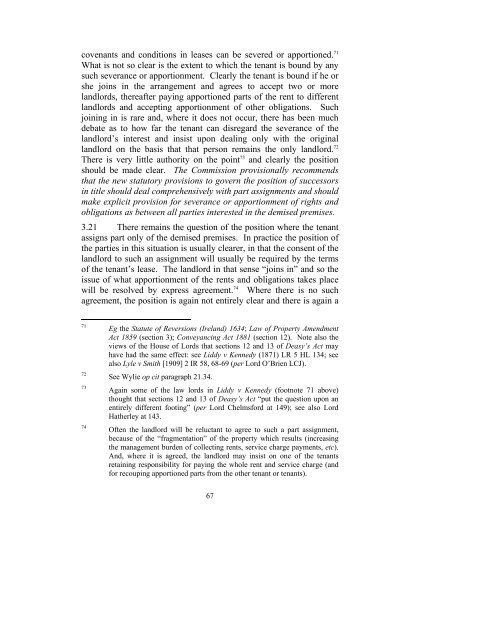Consultation Paper on the General Law of the Landlord and Tenant
Consultation Paper on the General Law of the Landlord and Tenant
Consultation Paper on the General Law of the Landlord and Tenant
You also want an ePaper? Increase the reach of your titles
YUMPU automatically turns print PDFs into web optimized ePapers that Google loves.
covenants <strong>and</strong> c<strong>on</strong>diti<strong>on</strong>s in leases can be severed or apporti<strong>on</strong>ed. 71What is not so clear is <strong>the</strong> extent to which <strong>the</strong> tenant is bound by anysuch severance or apporti<strong>on</strong>ment. Clearly <strong>the</strong> tenant is bound if he orshe joins in <strong>the</strong> arrangement <strong>and</strong> agrees to accept two or morel<strong>and</strong>lords, <strong>the</strong>reafter paying apporti<strong>on</strong>ed parts <strong>of</strong> <strong>the</strong> rent to differentl<strong>and</strong>lords <strong>and</strong> accepting apporti<strong>on</strong>ment <strong>of</strong> o<strong>the</strong>r obligati<strong>on</strong>s. Suchjoining in is rare <strong>and</strong>, where it does not occur, <strong>the</strong>re has been muchdebate as to how far <strong>the</strong> tenant can disregard <strong>the</strong> severance <strong>of</strong> <strong>the</strong>l<strong>and</strong>lord’s interest <strong>and</strong> insist up<strong>on</strong> dealing <strong>on</strong>ly with <strong>the</strong> originall<strong>and</strong>lord <strong>on</strong> <strong>the</strong> basis that that pers<strong>on</strong> remains <strong>the</strong> <strong>on</strong>ly l<strong>and</strong>lord. 72There is very little authority <strong>on</strong> <strong>the</strong> point 73 <strong>and</strong> clearly <strong>the</strong> positi<strong>on</strong>should be made clear. The Commissi<strong>on</strong> provisi<strong>on</strong>ally recommendsthat <strong>the</strong> new statutory provisi<strong>on</strong>s to govern <strong>the</strong> positi<strong>on</strong> <strong>of</strong> successorsin title should deal comprehensively with part assignments <strong>and</strong> shouldmake explicit provisi<strong>on</strong> for severance or apporti<strong>on</strong>ment <strong>of</strong> rights <strong>and</strong>obligati<strong>on</strong>s as between all parties interested in <strong>the</strong> demised premises.3.21 There remains <strong>the</strong> questi<strong>on</strong> <strong>of</strong> <strong>the</strong> positi<strong>on</strong> where <strong>the</strong> tenantassigns part <strong>on</strong>ly <strong>of</strong> <strong>the</strong> demised premises. In practice <strong>the</strong> positi<strong>on</strong> <strong>of</strong><strong>the</strong> parties in this situati<strong>on</strong> is usually clearer, in that <strong>the</strong> c<strong>on</strong>sent <strong>of</strong> <strong>the</strong>l<strong>and</strong>lord to such an assignment will usually be required by <strong>the</strong> terms<strong>of</strong> <strong>the</strong> tenant’s lease. The l<strong>and</strong>lord in that sense “joins in” <strong>and</strong> so <strong>the</strong>issue <strong>of</strong> what apporti<strong>on</strong>ment <strong>of</strong> <strong>the</strong> rents <strong>and</strong> obligati<strong>on</strong>s takes placewill be resolved by express agreement. 74 Where <strong>the</strong>re is no suchagreement, <strong>the</strong> positi<strong>on</strong> is again not entirely clear <strong>and</strong> <strong>the</strong>re is again a71727374Eg <strong>the</strong> Statute <strong>of</strong> Reversi<strong>on</strong>s (Irel<strong>and</strong>) 1634; <strong>Law</strong> <strong>of</strong> Property AmendmentAct 1859 (secti<strong>on</strong> 3); C<strong>on</strong>veyancing Act 1881 (secti<strong>on</strong> 12). Note also <strong>the</strong>views <strong>of</strong> <strong>the</strong> House <strong>of</strong> Lords that secti<strong>on</strong>s 12 <strong>and</strong> 13 <strong>of</strong> Deasy’s Act mayhave had <strong>the</strong> same effect: see Liddy v Kennedy (1871) LR 5 HL 134; seealso Lyle v Smith [1909] 2 IR 58, 68-69 (per Lord O’Brien LCJ).See Wylie op cit paragraph 21.34.Again some <strong>of</strong> <strong>the</strong> law lords in Liddy v Kennedy (footnote 71 above)thought that secti<strong>on</strong>s 12 <strong>and</strong> 13 <strong>of</strong> Deasy’s Act “put <strong>the</strong> questi<strong>on</strong> up<strong>on</strong> anentirely different footing” (per Lord Chelmsford at 149); see also LordHa<strong>the</strong>rley at 143.Often <strong>the</strong> l<strong>and</strong>lord will be reluctant to agree to such a part assignment,because <strong>of</strong> <strong>the</strong> “fragmentati<strong>on</strong>” <strong>of</strong> <strong>the</strong> property which results (increasing<strong>the</strong> management burden <strong>of</strong> collecting rents, service charge payments, etc).And, where it is agreed, <strong>the</strong> l<strong>and</strong>lord may insist <strong>on</strong> <strong>on</strong>e <strong>of</strong> <strong>the</strong> tenantsretaining resp<strong>on</strong>sibility for paying <strong>the</strong> whole rent <strong>and</strong> service charge (<strong>and</strong>for recouping apporti<strong>on</strong>ed parts from <strong>the</strong> o<strong>the</strong>r tenant or tenants).67
















